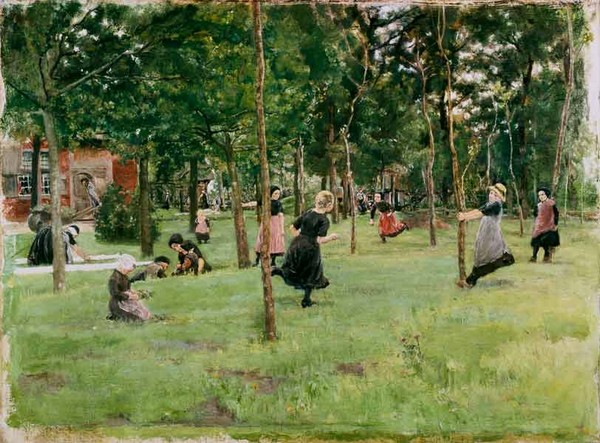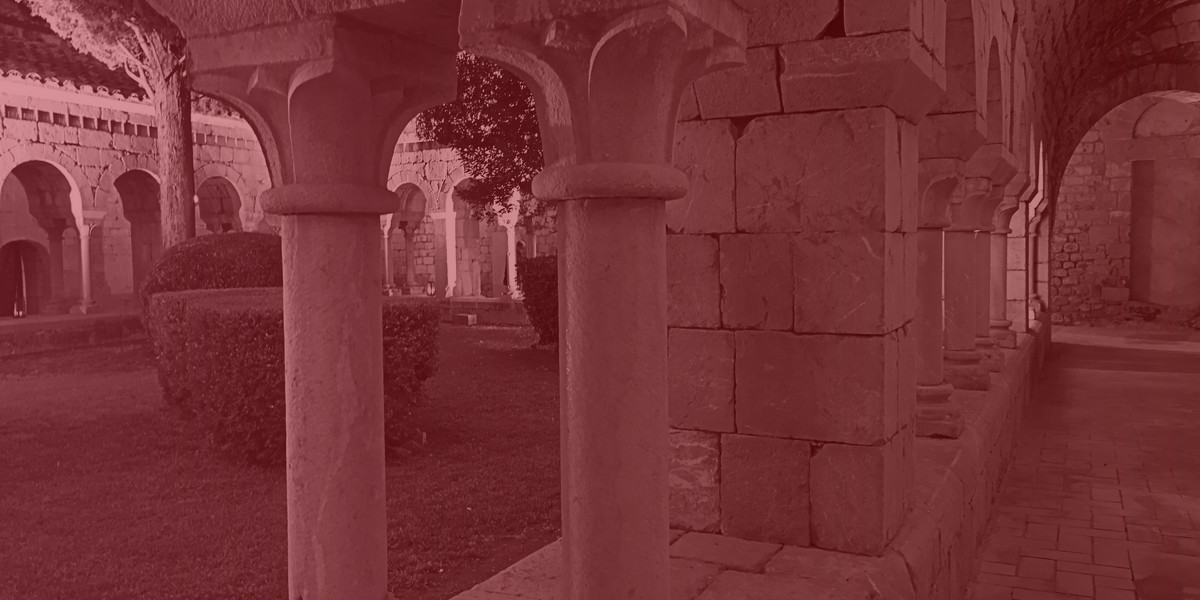
At the beginning of the 20th century, a boy invites a girl to play children's games, games that make skirts flutter or bodies touch by chance, and allow for brief encounters in secret places. This is what Joan Salvat Papasseit explains in his poem Platxèria [Amusement]. Through his verses, we imagine the scene of a film, just as we imagine the boys' smile and his delicacy. It's a scene full of joy at living that makes us smile as well.
What games does Salvat Papasseit refer to? Some games go from generation to generation, and I think we've all played hide and seek. The second game is, if I'm not mistaken, what I know as “hot and cold”: an object is hidden, and a child must find it using clues like “freezing, cold, warm, hot…”.
I'm not entirely clear on the third game the poet mentions. I found two different explanations for the game: one, that a child has to act out a character with a mimic and the others have to guess who it is; the other, that the game is like “hot and cold,” but the object is hidden in a child's clothes (that means tickles!) This second option seems to fit better the poem. Dear Salvador Pila translated the poem into English, and I hope he knew which games are playing in the poem better than I do. Anyway, I think the main idea is clear.
Platxèria was published in the collection La gesta dels estels, in 1922, two years before the poet died at his thirty. Eduard Toldrà set it into music in 1927 (in 1936 he composed the cycle La rosa als llavis, with poems from the last collection of Salvat Papasseit, El poema de la rosa als llavis). We will listen to the orchestral version of Platxèria, with Montserrat Caballé. She's accompanied by the Orquestra de Cambra conducted by Rafael Ferrer.
This delightful song is being played at the first concert of the Schubertada with baritone Ferran Albrich and pianist Albert Guinovart. We begin with this article the series dedicated to this festival, and we focus this week on the first three song recitals: that of Albrich, Guinovart and Oriol Prat; that of Josep-Ramon Olivé and Victoria Guerrero, and that of Erika Baikoff and James Baillieu.
As usual, you will find after the text of our song a link to the songs from these three concerts that we have heard so far on Liederabend, in case you want to review them.
Dolça amigueta, juguem a fet
o a corretgeta, o a bell indret.
Dolça amigueta, no tinguis por:
ni he d’allunyar-me ni en cap racó
fer-te malícies, o bé el distret
si acàs et cremes o ets a l’indret
on he amagada la teva flor:
si tu ets manyaga jo seré bo.
Dolça amigueta tornem al joc,
la teva escala farà de toc.
Si tu m’atrapes no et besaré,
si jo t’atrapo perdonaré
que no m’estimis. Ja em somriuràs.
Si et cau la trena jo et faré el llaç.
Sweet little friend, let’s play hide-and-seek,
or rag-tag, or at forfeits.
Sweet little friend, don’t be afraid:
neither will I go away, nor, in any nook,
I will do wrong to you, or even be inattentive
in case you burn yourself, or you happen to be in the place
where I have hidden your flower;
if you are gentle, I will be good.
Sweet little friend, let’s play again;
your stairway will be the start.
If you catch me, I will not kiss you;
if I catch you, I will forgive you
for not loving me. You will smile to me later on.
If your braid drops, I will tie it up.
(translation by Salvador Pila)
Friday, 11 August & Saturday, 12 August: Ferran Albrich, Albert Guinovart and Oriol Prat
Sunday, 13 August: Inés García, Josep-Ramon Olivé i Victoria Guerrero















Comments powered by CComment